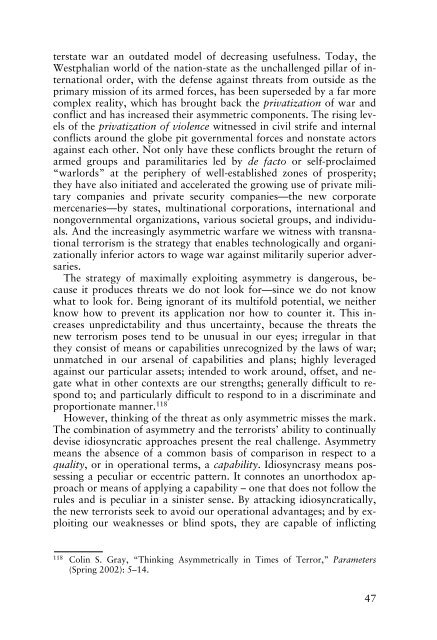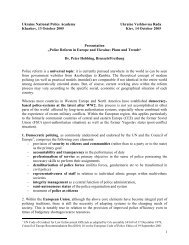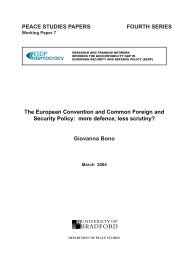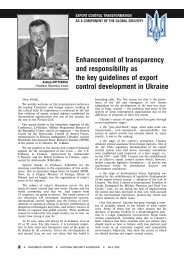combating terrorism and its implications for the security sector - DCAF
combating terrorism and its implications for the security sector - DCAF
combating terrorism and its implications for the security sector - DCAF
You also want an ePaper? Increase the reach of your titles
YUMPU automatically turns print PDFs into web optimized ePapers that Google loves.
terstate war an outdated model of decreasing usefulness. Today, <strong>the</strong><br />
Westphalian world of <strong>the</strong> nation-state as <strong>the</strong> unchallenged pillar of international<br />
order, with <strong>the</strong> defense against threats from outside as <strong>the</strong><br />
primary mission of <strong>its</strong> armed <strong>for</strong>ces, has been superseded by a far more<br />
complex reality, which has brought back <strong>the</strong> privatization of war <strong>and</strong><br />
conflict <strong>and</strong> has increased <strong>the</strong>ir asymmetric components. The rising levels<br />
of <strong>the</strong> privatization of violence witnessed in civil strife <strong>and</strong> internal<br />
conflicts around <strong>the</strong> globe pit governmental <strong>for</strong>ces <strong>and</strong> nonstate actors<br />
against each o<strong>the</strong>r. Not only have <strong>the</strong>se conflicts brought <strong>the</strong> return of<br />
armed groups <strong>and</strong> paramilitaries led by de facto or self-proclaimed<br />
“warlords” at <strong>the</strong> periphery of well-established zones of prosperity;<br />
<strong>the</strong>y have also initiated <strong>and</strong> accelerated <strong>the</strong> growing use of private military<br />
companies <strong>and</strong> private <strong>security</strong> companies—<strong>the</strong> new corporate<br />
mercenaries—by states, multinational corporations, international <strong>and</strong><br />
nongovernmental organizations, various societal groups, <strong>and</strong> individuals.<br />
And <strong>the</strong> increasingly asymmetric warfare we witness with transnational<br />
<strong>terrorism</strong> is <strong>the</strong> strategy that enables technologically <strong>and</strong> organizationally<br />
inferior actors to wage war against militarily superior adversaries.<br />
The strategy of maximally exploiting asymmetry is dangerous, because<br />
it produces threats we do not look <strong>for</strong>—since we do not know<br />
what to look <strong>for</strong>. Being ignorant of <strong>its</strong> multifold potential, we nei<strong>the</strong>r<br />
know how to prevent <strong>its</strong> application nor how to counter it. This increases<br />
unpredictability <strong>and</strong> thus uncertainty, because <strong>the</strong> threats <strong>the</strong><br />
new <strong>terrorism</strong> poses tend to be unusual in our eyes; irregular in that<br />
<strong>the</strong>y consist of means or capabilities unrecognized by <strong>the</strong> laws of war;<br />
unmatched in our arsenal of capabilities <strong>and</strong> plans; highly leveraged<br />
against our particular assets; intended to work around, offset, <strong>and</strong> negate<br />
what in o<strong>the</strong>r contexts are our strengths; generally difficult to respond<br />
to; <strong>and</strong> particularly difficult to respond to in a discriminate <strong>and</strong><br />
proportionate manner. 118<br />
However, thinking of <strong>the</strong> threat as only asymmetric misses <strong>the</strong> mark.<br />
The combination of asymmetry <strong>and</strong> <strong>the</strong> terrorists’ ability to continually<br />
devise idiosyncratic approaches present <strong>the</strong> real challenge. Asymmetry<br />
means <strong>the</strong> absence of a common basis of comparison in respect to a<br />
quality, or in operational terms, a capability. Idiosyncrasy means possessing<br />
a peculiar or eccentric pattern. It connotes an unorthodox approach<br />
or means of applying a capability – one that does not follow <strong>the</strong><br />
rules <strong>and</strong> is peculiar in a sinister sense. By attacking idiosyncratically,<br />
<strong>the</strong> new terrorists seek to avoid our operational advantages; <strong>and</strong> by exploiting<br />
our weaknesses or blind spots, <strong>the</strong>y are capable of inflicting<br />
118 Colin S. Gray, “Thinking Asymmetrically in Times of Terror,” Parameters<br />
(Spring 2002): 5–14.<br />
47

















